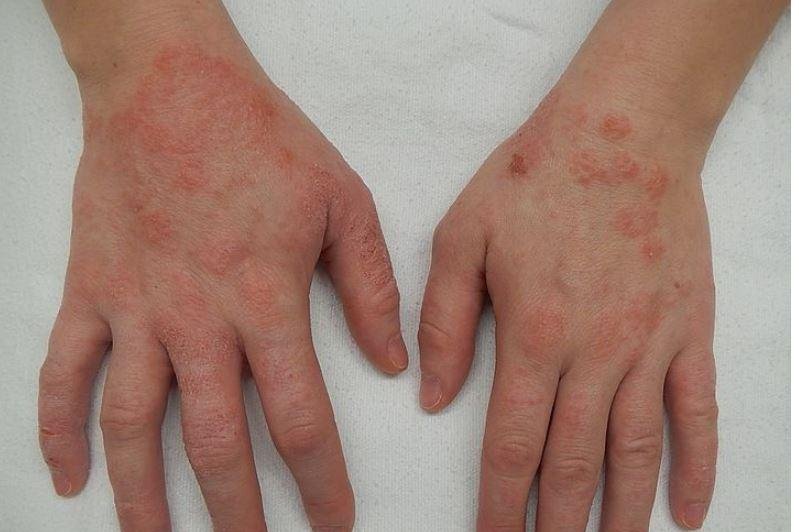Rather than current steroid creams and a recently approved biologic to treat eczema, researchers in Boston believe they have found a method of preventing the allergic reaction that causes the irritating condition. Photo by Dr. James Heilman/Wikimedia Commons
March 6 (UPI) -- Researchers in Boston have found a different approach to treating eczema -- one that stimulates a natural halt to the allergic attack, as opposed to current steroid treatments on the market.
Present methods to alleviate the dry and itching skin of eczema can be expensive or have side effects, so researchers at Boston Children's Hospital sought an alternative target for treatment, which they outline in findings published Friday in the journal Science Immunology.
Eczema affects about 30 percent the U.S. population and mainly is found in children and adolescents, according to the National Institute of Allergy and Infectious Diseases. Eczema patients are susceptible to bacterial, viral and fungal skin infections, and in some cases the condition can lead to food allergies or asthma.
Although no cure has been found for eczema, treatments and self-care measures can relieve itching and prevent new outbreaks. Aside from creams and ointments, patients also avoid harsh soaps and moisturize their skin regularly.
Eczema's skin inflammation is driven by "type 2" immune responses, which are led by activated T helper 2 cells and type 2 innate lymphoid cells, known as effector cells.
Another group of T cells, called regulatory T cells, or Tregs, reduce type 2 responses and suppress the allergic response.
In eczema lesions, the number of Tregs are unchanged from regular skin -- Tregs comprise only about 5 percent of the body's T cells, but up to 50 percent of T cells in the skin.
"Our question was, is there something special about the Tregs that reside in the skin?" study author Dr. Raif Geha, chief of the Division of Immunology at Boston Children's Hospital, said in a blog post.
Researchers used two separate mouse models of eczema to examine cellular pathways that lead to allergic skin inflammation. After purifyng Tregs from the animals' skin and blood, they compared the genes they express.
Several genes were likely to be turned on in the skin Tregs. One of them encodes retinoid-related orphan receptor alpha, or RORα, a transcription factor that regulates many other genes.
Using a "genetic trick," the researchers removed RORα only from Tregs, finding a three-fold increase in inflammatory cells and allergic inflammation in the mice.
"The two kinds of immune cells are competing for TL1A," Geha said. "If Tregs don't have this receptor, they can't 'see' TL1A. Not only are they not activated, but more TL1A is available to activate the effector cells. So you have a double whammy."
Human samples were similar to mice -- higher expression of RORα in skin Tregs compared with those in blood -- suggesting that boosting RORα or otherwise improving the migration and function of Tregs, possibly with a topical cream, could achieve a reduction in allergic inflammation.
Researchers say that more work is required to test for additional therapeutic targets, in addition to finding ways to attack them, but Geha said he believes there are several treatment methods that could be effective against eczema as a result of the new findings.















